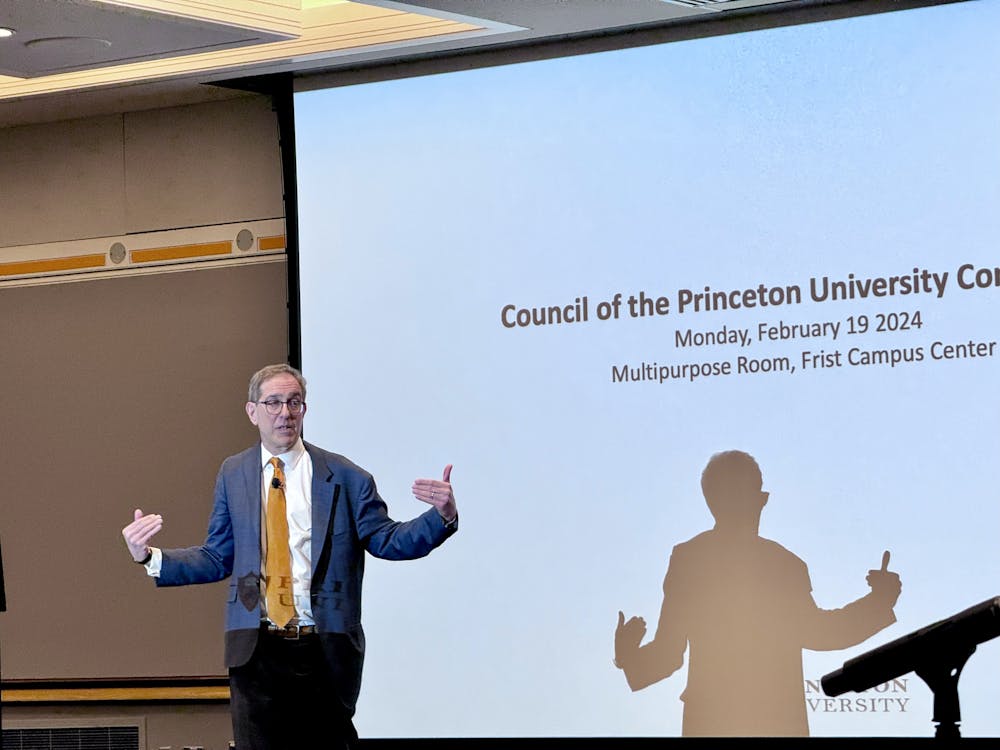Content Warning: The following article includes mention of student death.
University Counseling services are available at 609-258-3141, and the Suicide Prevention Lifeline is available 24/7 at 988 or +1 (800) 273-TALK (8255). A Crisis Text Line is also available in the United States; text HOME to 741741. Students can contact residential college staff and the Office of Religious Life for other support and resources.
University President Christopher Eisgruber ’83 faced significant questioning about campus mental health at the Council of the Princeton University Community (CPUC) meeting on Monday, Feb. 19. Council members and members of the audience raised concerns about the intersection of academics and mental health, additional support for first-generation students, and financial coverage of mental healthcare treatment.
Eisgruber began his speech with an acknowledgement of the recent death of James Li ’27.
“I’m mindful as we begin this that all of us in the broader Princeton community right now are grieving the death of James Li,” Eisgruber said.
The meeting comes three days after Li was fatally struck by the Princeton Dinky shuttle on campus at the Faculty Road crossing. This is the eighth student death in the past three years.
The CPUC is composed of faculty, students, staff, and alumni representatives and holds six annual meetings that are open to the University community. Monday’s CPUC meeting was a Town Hall with Eisgruber, during which he discussed his annual State of the University letter before shifting the meeting to a Q&A format. A significant portion of the Q&A was devoted to the mental health conversation.
CPUC Council member Judah Guggenheim ’25 asked Eisgruber whether or not the University will take national leadership in the mental health crisis by adopting “existing recommendations to extend the semester, to offer summer courses or opportunities for five-year graduation frames, and to significantly invest financially in mental health resources.”

Eisgruber first recognized the anguish associated with the loss of a community member and the importance of the mental health conversation before describing examples of the University’s actions to address mental health.
“There are tragedies that take place, even when people do all the things that they should be doing,” he said.
He cited investment in Counseling and Psychological Services (CPS) “on an aggressive scale” and the construction of Frist Health Center which will serve to center student well-being. The center is scheduled to open in 2025.
Eisgruber also challenged Guggenheim’s implication that academic rigor negatively affects student mental health, citing other factors that impact mental health, such as sleep, substance abuse, social connection, belonging, and purpose.

In November 2022, Eisgruber told the ‘Prince,’ “I think high aspiration environments, and that includes academically rigorous environments, are fully consistent with and helpful to mental health.” The remark drew criticism from many students.
In an interview with the ‘Prince’ after the meeting, Guggenheim said that he believes Eisgruber and the University are taking the mental health conversation seriously. However, Guggenheim also disputed what he calls Eisgruber’s “division between academic elements of Princeton and student mental health.”
Guggenheim added, “I think that it is definitely true that mental health challenges are not unique to Princeton. But I also think it’s true that there are decisions that Princeton can make about the way it conducts academics and other programs to help students’ mental health.”
CPUC Council member Sarah Bard GS referenced Eisgruber’s response to Guggenheim on the correlation between academics and mental health when specifically asking about mental health support for first-generation students.
During the meeting, Vice President for Campus Life W. Rochelle Calhoun described Outreach Counselors, who “work very specifically with particular communities on our campus” and the Emma Bloomberg Center for Access and Opportunity (EBCAO). Eisgruber also referenced the EBCAO in his response as “promoting belonging for all of our students, but particularly for our first-gen and low income students.”
Several students, including Christopher Catalano GS, the vice president of Graduate Student Government, asked about the perceived burden of $20 co-pays for therapy or psychiatric visits covered through the Student Health Plan. Catalano noted during the meeting that the resulting cost for a year of mental health care, assuming weekly visits, could be as much as $1,000.
Both Eisgruber and Calhoun responded that barriers to accessing mental health care were a significant issue. Calhoun pointed to the University’s program offering free Lyft rides to off-campus medical appointments, including those for mental health.
“We should not allow the ability to pay a copay … to be a deterrent from seeking care,” Calhoun affirmed. Calhoun did not commit to specifically eliminating or reducing the co-pay.
“We have to think carefully about how to use co-pays that I think are, on the one hand, an important part of what is still a very generous program that is provided and, on the other hand, we understand can, at some point, be a deterrent or a concern for people,” Eisgruber noted.
“I was actually pleasantly surprised,” Catalano said in reference to Calhoun’s and Eisgruber’s response on co-pays in an interview with the ‘Prince.’ “They seemed very open to the idea.”
Thomas Catalano is an assistant News editor for the ‘Prince.’
Associate News editor Miriam Waldvogel contributed reporting to this article.
Please send corrections to corrections[at]dailyprincetonian.com.








